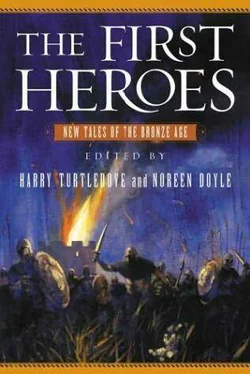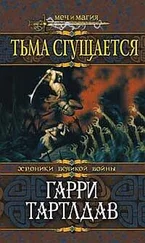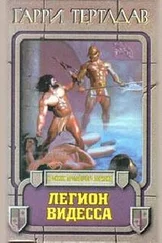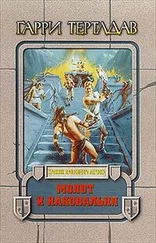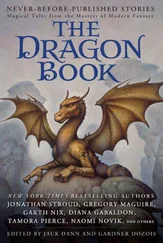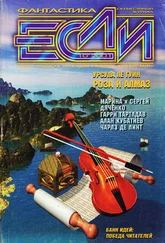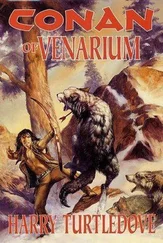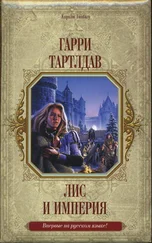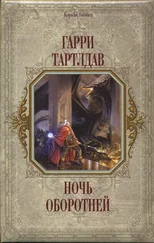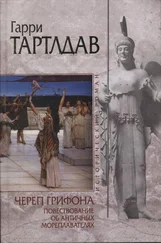Гарри Тертлдав - The First Heroes
Здесь есть возможность читать онлайн «Гарри Тертлдав - The First Heroes» весь текст электронной книги совершенно бесплатно (целиком полную версию без сокращений). В некоторых случаях можно слушать аудио, скачать через торрент в формате fb2 и присутствует краткое содержание. Жанр: Фантастика и фэнтези, на английском языке. Описание произведения, (предисловие) а так же отзывы посетителей доступны на портале библиотеки ЛибКат.
- Название:The First Heroes
- Автор:
- Жанр:
- Год:неизвестен
- ISBN:нет данных
- Рейтинг книги:3 / 5. Голосов: 1
-
Избранное:Добавить в избранное
- Отзывы:
-
Ваша оценка:
- 60
- 1
- 2
- 3
- 4
- 5
The First Heroes: краткое содержание, описание и аннотация
Предлагаем к чтению аннотацию, описание, краткое содержание или предисловие (зависит от того, что написал сам автор книги «The First Heroes»). Если вы не нашли необходимую информацию о книге — напишите в комментариях, мы постараемся отыскать её.
The First Heroes — читать онлайн бесплатно полную книгу (весь текст) целиком
Ниже представлен текст книги, разбитый по страницам. Система сохранения места последней прочитанной страницы, позволяет с удобством читать онлайн бесплатно книгу «The First Heroes», без необходимости каждый раз заново искать на чём Вы остановились. Поставьте закладку, и сможете в любой момент перейти на страницу, на которой закончили чтение.
Интервал:
Закладка:
"Surely we did not," I said, "except that we did." I wish I could claim I sounded better than Nessus. In fact, I can. But claiming a thing does not make it true. How I wish it did!
He turned his tail on the chaos, the carnage, the carrion. It was as if he could not bear to see himself mistaken. Again, blaming him is not easy. Who would wish to be reminded of . . . that?
"Did we slay all the mans?" Hylaeus asked.
"I think not." I shook my head, which sent fresh pangs shooting through it. "No, I know not. Some of them fled off into the night." "That is not good," Nessus said. "They will bring more of their kind here. They will seek vengeance."
There, he was bound to be right. And the mans would have good reason to hunger for revenge. Not only had we slain their warriors, we had also outraged and slain their shes. Had some other folk assailed us so, we too would have been wild to avenge.
I looked inland. I saw nothing there, but I knew the mans did not yet thickly settle this part of the Tin Isle, the other folk who had lived hereabouts having only recently died out. I also knew this did not mean vengeance would not fall upon us, only that it might be somewhat delayed. "We would do well not to be here when more mans come," I said. "We would do well to be on our way back toward the Inner Sea."
"There is a coward's counsel!" Oreus exclaimed. "Better we should fight these miserable mans than run from them."
"Can you fight five mans by yourself? Can you fight twenty mans by yourself?" I asked him, trying to plumb the depths of his stupidity.
It ran deeper than I had dreamt, for he said, "We would not be alone. The other folk of this land would fight with us, would fight for us."
"What other folk?" I inquired of him. "When the other folk of this land meet mans, they perish." Perhaps the madness of the cerevisia had not worked altogether for ill for us. Mad with drink, we had not fretted over our place in the scheme of things and that of the strange folk who sought to find rules (rules!—it chills me yet) in the gods' heavens.
Oreus would have argued further, but Nessus kicked him, not too hard, in the flank. "Cheiron is right," he said. "Maybe one day we can sail back here in greater numbers and try conclusions with these mans. For now, though, we would be better gone."
The thought that we might return one day mollified the young, fiery he. Nessus knew better than I how to salve Oreus's pride. "Very well, let us go, then," Oreus said. "The mans will not soon forget us."
Nor we them, I thought. But I did not say that aloud. Instead, I helped the rest of us push the Horse of Bronze into the sea, which luckily lay almost under her keel. With all those sacks of tin in her, the work still was not easy, but we managed it. The gods sent us a fair wind out of the east. I ordered the yard raised on the mast and the sail lowered from it. We left the Tin Isle behind.
Our homeward journey was neither easy nor swift. If I speak of it less than I did of the voyage outward, it is because so many of the hazards were the same. For the first two days after we left the Tin Isle, I do admit to anxiously looking back over my tail every now and again. I did not know for a fact whether the mans had mastered the art of shipbuilding. If they had, they might have pursued.
But evidently not. We remained alone on the bosom of Ocean the Great, as far as my eyes could tell.
Sailing proved no worse—and possibly better—than it had on our northward leg. We stayed in sight of land when we could, but did not stay so close that we risked being forced onto a lee shore by wind and wave rolling out of the west. And rolling is truly the word, for we saw waves on Ocean the Great that no one who has sailed only the Inner Sea can imagine.
With the Chalcippus more heavily laden than she had been while we were outward bound, I did not like to bring her up on the beach every night. I had learned to respect and to fear the rise and fall of the waters against the land, which seems to happen twice a day in the regions washed by the Ocean. If the waters withdrew too far, we might not be able to get the galley back into the sea. To hold that worry at arm's length, we dropped anchor offshore most nights.
That too, of course, came with a price. Because we could not let the ship's timbers dry out at night, they grew heavy and waterlogged, making the Horse of Bronze a slower and less responsive steed than she would otherwise have been. Had a bad storm blown up, that might have cost us dear. As things were, the gods smiled, or at least did not frown with all the grimness they might have shown, and we came safe to the Inner Sea once more.
As we sailed east past the pillars said to hold up the heavens, I wondered once more about the mans, and how they escaped the gods' wrath. Most folk—no, all folk I had known up until then—are content to live in the world the gods made and to thank them for their generous bounty. What the gods will, lesser folk accept, as they must—for, as I have remarked, the essence of godhood is power. Were I as powerful as a god, what would I be? A god myself, nothing else. But I am not so powerful and so am no god. Nor are these mans gods. That was plain. In our cerevisia-spawned madness, we slew them easily enough. Yet they have the arrogance, the presumption, to seek out the gods' secrets. And they have the further arrogance and presumption to believe that, if they find them, they can use them.
Can a folk not given godlike powers arrogate those powers to itself? The mans seem to think so. How would the gods view such an opinion? If they did take it amiss, as I judged likely, how long would they wait to punish it?
Confident in their own strength, might they wait too long? If a folk did somehow steal godlike power, what need would it have of veritable gods? Such gloomy reflections filled my mind as we made our way across the Inner Sea. I confess to avoiding the sirens' island on the homeward journey. Their temper was unpleasant, their memories doubtless long. We sailed south of them instead, skirting the coast where the lotus-eaters dwell. I remember little of that part of the voyage; the lotus-eaters, I daresay, remember less.
I do remember the long sail we had up from the land of the lotus-eaters to that of the fauns. The sail seemed the longer because, as I say, we had to keep clear of the island of the sirens. We filled all the water jars as full as we could. This let us anchor well off the coast of their island as we traveled north. We also had the good fortune of a strong southerly breeze. We lowered the sail from the yard, then, and ran before the wind. Our hes were able to rest at the oars, which meant they did not grow thirsty as fast as they would have otherwise. We came to the land of the fauns with water still in the jars—not much, but enough.
That breeze had held for us all the way from the land of the lotus-eaters to that which the fauns call home. From this, I believe—and I certainly hope—the gods favored our cause and not the sirens'. This I believe and hope, yes. But I have not the gall to claim it -proves the gods favored us, or to use it to predict that the gods would favor us again in the same way. I am not a man. I do not make stone circles. I do not believe a stone circle can measure the deeds and will of the gods.
By what has befallen the other folk on the Tin Isle besides the mans, I may be mistaken.
From the easternmost spit of the fauns' homeland to ours is but a short sail. Yet the Horse of Bronze came closer to foundering there than anywhere on turbulent Ocean the Great. A storm blew up from nowhere, as it were. The Chalci-p-pus pitched and rolled and yawed. A wave crashed over the bow and threatened to swamp us. We all bailed for our lives, but another wave or two would have stolen them from us. And then, as abruptly as it had sprung to life, the storm di ed. What conclusion was I to draw from this? That the gods were trying to frighten me to death but would spare me if they failed? That drawing conclusions about what the gods intend was a risky business, a fool's game? I had already known as much. I was not a man, to require lessons on the subject.
Читать дальшеИнтервал:
Закладка:
Похожие книги на «The First Heroes»
Представляем Вашему вниманию похожие книги на «The First Heroes» списком для выбора. Мы отобрали схожую по названию и смыслу литературу в надежде предоставить читателям больше вариантов отыскать новые, интересные, ещё непрочитанные произведения.
Обсуждение, отзывы о книге «The First Heroes» и просто собственные мнения читателей. Оставьте ваши комментарии, напишите, что Вы думаете о произведении, его смысле или главных героях. Укажите что конкретно понравилось, а что нет, и почему Вы так считаете.
